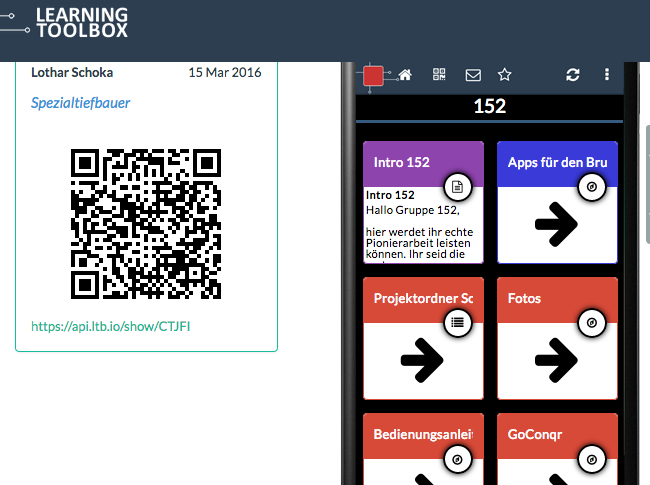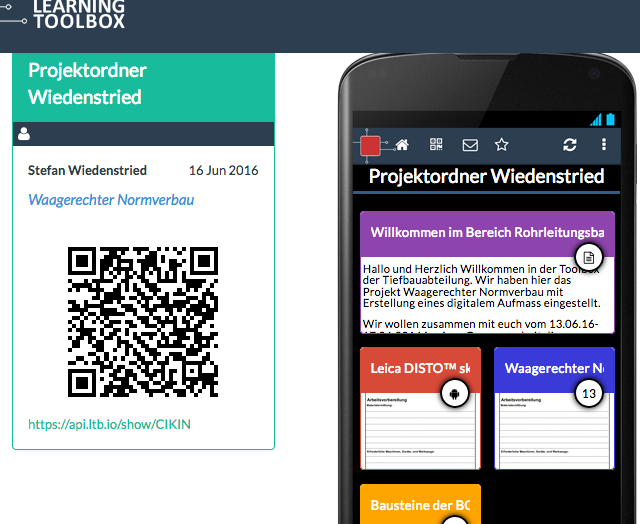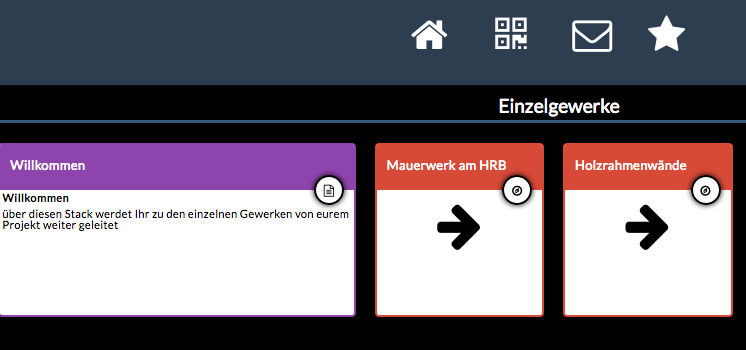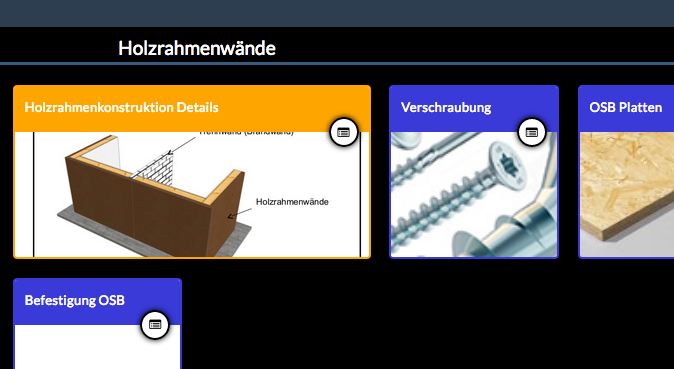Learning Toolbox (LTB) as Support for Action-Oriented Learning in the Apprentice Training of Bau-ABC - Instances of Change
Highlights
This document gives insights into the role of Learning Toolbox (LTB) as a support for the pedagogic approach of trainers in Bau-ABC Rostrup in apprentice training. The co-design process emphasised the importance to support the culture of action-oriented and self-organised learning in projects. The evaluation studies and field visits of research teams have drawn attention to pattern variance between trainers’ approaches and to new pedagogic initiatives, such as
-
Use of the Learning Toolbox as support for problem-oriented learning: This emphasis is reflected by providing immediately access to comprehensive sets of reference materials.
-
Use of the Learning Toolbox as support for interest-oriented learning: This emphasis is reflected by providing gradually access to web resources and to examples of others’ solutions.
-
The scenario drawn on the basis of these findings takes further the idea of supporting common learning contents with the help of Learning Toolbox.
-
The scenario points to possibilities to link the strengths of two different pedagogic approaches with the help of further software development. In this way the scenario seeks to support learning processes that have special relevance in companies and at construction sites.
Motivation and the contribution of Research & Development Interventions
Already the introduction of the White Folder (Weisser Ordner) in Bau-ABC as the apprentices’ collection of instruction materials, worksheets, reporting documents and self-evaluation sheets can be seen as an early operationalisation of action-oriented learning. It reflected the attempt to make holistic occupational working and learning tasks transparent as ‘projects’ that contribute to the acquisition of holistic vocational competences. In a similar way, the projects reflected the approach to self-organised learning (Selbstorganisiertes Lernen) inasmuch the apprentices were invited to take responsibility on self-organised acquisition of information, self-organised planning, self-organised task execution and self-organised assessment of the results.
However, in practice the use of paper-based instruction sheets and reference materials restricted the possibilities for apprentices to develop their capabilities as self-organised learners. In this respect the co-design activities to develop the Learning Toolbox were welcomed by Bau-ABC trainers as a chance to empower the learners and increase their ownership of their learning processes. In particular they were looking forward to enhance the apprentices’ opportunities for self-organised acquisition of information and planning of tasks from the Internet.
From the conceptual point the ITB team revisited the basic concept ‘action-oriented learning’ which is the foundation of the above described pedagogic approach of Bau-ABC trainers. Likewise, the ITB team revisited the concept ‘work process knowledge’, which refers to matching competences, mutual adjustment and shared learning in work-related innovation processes (see the links below). From the practical point some Bau-ABC trainers expressed their key principles and ideas for piloting in a discussion that was recorded by a video filmed for the Learning Layers project (see the links below).
Opportunities enabled by the functionality of Learning Toolbox
Below three exemplars are presented on the changes introduced via using the Learning Toolbox (LTB) as a means to promote action-oriented learning, but with somewhat different priorities regarding the availability of resources, and the collaboration between different trades. The exemplars are presented with t screenshots from the LTB stacks prepared by Bau-ABC trainers to support their training.
A. Wide access to resources & explorative learning vs. selective access and gradual opening


Screenshots 1 and 2: Different strategies in making learning resources available (multitude of navigation tiles leading to further stacks vs. few tiles that open new screens)
B. Collaboration between trades in a joint project, integrative learning (Carpenters & Bricklayers)


Screenshots 3 and 4: Example of a joint training project of two trades (Carpenters and Bricklayers) – navigation screen referring to the sub-stacks of both trades vs. common content screen that illustrates the integration of the work processes of both trades.
Insights into changes or variations in training strategies
Below we present some insights into the changes in the training approaches and in the impulses for learners as our findings from recent field visits. We illustrate our findings with quotes from interviews with trainers and from focus group sessions with apprentices.
Two trainers’ approaches to using the Learning Toolbox: The metaphors ‘well’ and ‘watering can’
It appeared that the trainers had set somewhat different pedagogic accents that were reflected in their stacks - and in the kind of learning that the stacks supported. The trainers explicated these priorities in the interviews (see [1]):
a) LTB as a “well” - wide access to resources & explorative learning
Some trainers put an emphasis on equipping the apprentices with comprehensive sets of reference materials and challenging them to do selective and searches for their purposes. One trainer reported:
“LTB allows us to guide apprentices to find the webpages and links for certain topics for their needs […]. It makes it easier for the apprentices to learn whenever and wherever they want as the whole material is constantly available on LTB […] We have to trust in what the apprentices are doing and we have to remember that we cannot control everything. They will grow by what they are doing and not by what we tell them to do and not to do. The apprentices shall be allowed to try things out and also to make mistakes”
The quote demonstrates that trainers following this approach see the LTB as a storage where all relevant learning material is provided and apprentices autonomously explore content. The trainers accept a reduced level of control upon apprentices’ actual use of these resources. Instead, the trainers emphasise that the apprentices need to get used to self-organised acquisition of problem-relevant information from trustworthy sources. For this approach we use the metaphor of a ‘well’ for stacks as stable learning resources.
b) LTB as a “watering can” - selective access and gradual opening* *
Other trainers put an emphasis on selective access and gradual opening of learning material. This approach can be characterized by a reflective view on why certain content is provided and how:
“You have to arouse interest of the apprentices, it has to make sense and supportive for specific cases what you put in there! There should not be too much content in the LTB, I don’t want to drive them crazy, so I decided to start with providing material on how to make an ‘Aufmaß’ […] Putting everything in there is simply too much. Stacks should be build related to specific projects, not all content in one stack”
We used the metaphor of a ‘watering can’ for such tool usage. Trainers who use such an approach are convinced that LTB helps for a deeper understanding and making work life for apprentices easier in the long run. Hence, trainers focus on providing well-selected material for further reading and learning, i.e. theoretical background information that relates to a project task. Trainers following such an approach strongly reflect on the type and extent of content provided via the LTB.
This approach, however, requires trainers to have a sophisticated ‘game plan’ behind the selective provision and gradual opening of learning material. This is illustrated by the comment of a trainer from road-building:
…when you provide photos to the apprentices illustrating an example how to lay bricks, they take it as a template and not inspiration. You have to instruct them well, you need to provide such instructions in LTB, e.g. with a text ‘do not copy, it is an example’”
To put in a nutshell, using LTB as a “watering can” fosters learning as it is more selective and adapted to the needs of the learners. However, it requires constant reflection on scheduling the instructions vis-à-vis the progress of learners and their professional growth.
Insights into changes in learning culture and into empowerment of learners
The apprentices responded positively to both types of pedagogic approaches and acknowledged the advantages for their trades. The well-builders emphasised that they are expected to work on their own at remote construction sites and need to develop themselves as self-organised learners and problem-solvers. The carpenters, bricklayers and road-builders emphasised that they need to learn to work in the light of client’s wishes (who may require for instance special styles and decorations). Moreover, the apprentices emphasised that the LTB helps them to get feedback from the trainers in writing and to express their questions or problems with digitised photos or videos. Furthermore, they have improved access to instructions and they can use digital tools in their own reporting. Finally, if the assessment is based on digital documents (including photos or videos), their achievements and shortcomings are more transparent and the reports are genuinely their own, not copied from peers.
Scenarios
The evaluation studies brought into picture different training strategies of Bau-ABC trainers (and respective differences learning behaviour of their apprentices). These were characterised as problem-oriented strategy (equipping learners with comprehensive resources to be searched) and interest-oriented strategy (opening the access to resources gradually). The tension between these approaches is of importance for transversal learning areas like Health and Safety (Arbeitssicherheit und Gesundheitsschutz) and for special learning areas like knowledge of DIN norms. So far access to appropriate learning resources or finding user-friendly ways to deliver training have been challenges.
In the present stacks the trainers have provided links to official materials provided by competent bodies or to selected extracts. An interim step can be provided by using platforms like Moodle as collector of selected resources and extracts with brief introduction. The integration of Learning Toolbox with Moodle (or similar platforms) can already make these resources available more quickly. However, a further step in implementing action-oriented learning can be provided by using context-specific ‘gamification’ as support for such learning. Here we can outline two scenarios:
-
The Health and Safety-training scenario prepares the apprentices for taking more responsibility on health and safety issues at workplace. The game version presents different action contexts (taking precaution measures, acting when occupational hazards occur, making control visits as shop steward for health and safety with representative of competent body). The game brings these action contexts and tasks as levels of performance progressing from general knowledge to specialised knowledge.
-
The Norm awareness-training scenario prepares apprentices for working alone as skilled workers on remote worksites (e.g. well-builders drilling at remote locations) to encounter problem situations and to act according to the norms and established procedures.
Reflections
When re-examining the results of focus groups and interviews, the researchers concluded that the findings can be conceptualised in the following way:
-
It is appropriate to distinguish between a) a problem-oriented training strategy(that seeks to equip self-organised learners with overview on key resources) and b) an interest-oriented training strategy (that seeks to open access to new resources and challenges on the basis of learners’ interests and achievements).
-
Both for trainers and apprentices the use of Learning Toolbox had multiple consequences. Yet, these could not be characterised as ‘digital revolution’ but rather as ‘digital transformation’ via small steps and solutions that are easily integrated into daily work.
Regarding the importance of Bau-ABC as a multiplier of innovations in the construction sector it is appropriate to make the following points:
-
So far most of the piloting has occurred with groups of apprentices that are at the beginning or in the middle of their training. This may give the impression that the use of Learning Toolbox and the related pedagogic approaches only focus on apprentice training. Yet, in the feedback from trainers and apprentices the use of the toolset was appreciated for its relevance for working life.
-
The scenario addresses two areas of learning (Health and Safety; Awareness on DIN norms) in which the training functions of Bau-ABC are not limited to the initial vocational education and training. Instead, these areas are of importance for continuing vocational training and for informal learning alongside working. With these target areas (among others) the role of Bau-ABC as promoter of Lifelong Learning in construction sector provides further challenges to develop the potentials of the Learning Toolbox as an integrative toolset.
Glossary
Action-oriented learning (Handlungsorientiertes lernen)
The term ‘action-oriented learning’ can refer to
a) a conceptual background thinking and related curriculum development movement in the German vocational education and training research (Berufspädagogik) and to
b) practical implementation of the ideas in teaching and training arrangements in vocational schools, companies and intermediate training centres (Überbetriebliche Ausbildungsstätten)
a. Conceptual background
At the conceptual level the concept ‘action-oriented learning’ links to each other following ideas:
-
Culture of vocational professionalism (Beruflichkeit) in education and training of skilled workers;
-
Integrated holistic occupational profiles (Integrierte Berufsbilder) as basis of holistic curricula;
-
Integrated action-oriented competences (Integrierte Handlungskompetenzen) - domain-specific competences, methodological competences, communicative competences, personal development competences - as guiding pedagogic principles;
-
Paradigmatic occupational tasks (Berufliche Arbeitsaufgaben) as contexts for task performance, getting engaged in vocational knowledge processes and for professional growth.
-
Occupational aptitude (Berufliche Handlungskompetenz) is the overarching qualification goal of vocational education and training (VET) in Germany. The aim is to acquire an expert-level competence in the set of paradigmatic work tasks and processes related to the occupation. The acquisition of such aptitude is based on performance in real (or realistic) occupational contexts. Thus, the acquisition of occupational aptitude is the guiding principle of vocational curricula.
b. Practical implementation
At the level of practical implementation the concept ‘action-oriented learning’ refers to the following principles in shaping the teaching and training arrangements:
-
Complete occupational work cycles (Vollständige Arbeitshandlungen) as contexts for vocational learning processes and as criteria for assessing the progress of learners;
-
Culture of self-organised learning (Selbstorganisiertes lernen) introduced throughout the process cycle: self-organised information retrieving, planning, task execution and assessment (of the outcome and one’s own learning).
Links
Tools
Impact cards
Use of Learning Toolbox by Bau-ABC Trainers and Apprentices
Multimedia Training for and with Bau-ABC Trainers
Research Methodologies
Learning Toolbox videos from Bau-ABC (2014)
LTB Video 1/2014 The Multimedia Training of Learning Layers has had impact
LTB Video 2/2014 Bau-ABC trainers’ views on the use of Learning Toolbox in training
LTB Video 3/2014 Use of Learning Toolbox in an apprentice’s project in Bau-ABC
Learning Layers Theory Camp (2014) papers
WP2/ Vocational and Workplace Learning: Approaching a Synthesis: - Workplace Learning, Vocational Knowledge Processes, Working and Learning Tasks. ResearchGate DOI: 10.13140/RG.2.2.30863.79523
WP3/ Vocational and Workplace Learning: Reviewing Vocational and Workplace-based learning - Summary. ResearchGate DOI: 10.13140/RG.2.2.26805.47842
Literature
Learning and working tasks as elements of work-related vocational education and training, [2]
Work analysis and curriculum based on the Beruf concept, [3]
Praktisches Wissen und berufliche Handlungskompetenz, [4]
Contributing Authors
Pekka Kämäräinen, Melanie Campbell, Markus Manhart, Jaanika Hirv
References
- V. Banken, M. Geiger, R. Maier, M. Manhart, C. Sarigianni, S. Thalmann, and J. Thiele, “Report of Summative Evaluation in the Construction Pilots,” pp. under review, 2016 [Online]. Available at: Link
- F. Howe, “Learning and working tasks as elements of work-related vocational education and training,” European perspectives on learning at work: the acquisition of work process knowledge / Martin Fischer ... (eds.), pp. 304–322, 2004 [Online]. Available at: http://katalog.suub.uni-bremen.de/DB=1/LNG=DU/CMD?ACT=SRCHA&IKT=8000&TRM=72266699*
- F. Rauner, “Work analysis and curriculum based on the Beruf concept,” European perspectives on learning at work: the acquisition of work process knowledge / Martin Fischer ... (eds.), pp. 237–256, 2004 [Online]. Available at: http://katalog.suub.uni-bremen.de/DB=1/LNG=DU/CMD?ACT=SRCHA&IKT=8000&TRM=72266699*
- F. Rauner, Praktisches Wissen und berufliche Handlungskompetenz. Bremen: ITB, 2004 [Online]. Available at: http://katalog.suub.uni-bremen.de/DB=1/LNG=DU/CMD?ACT=SRCHA&IKT=8000&TRM=70879574*
